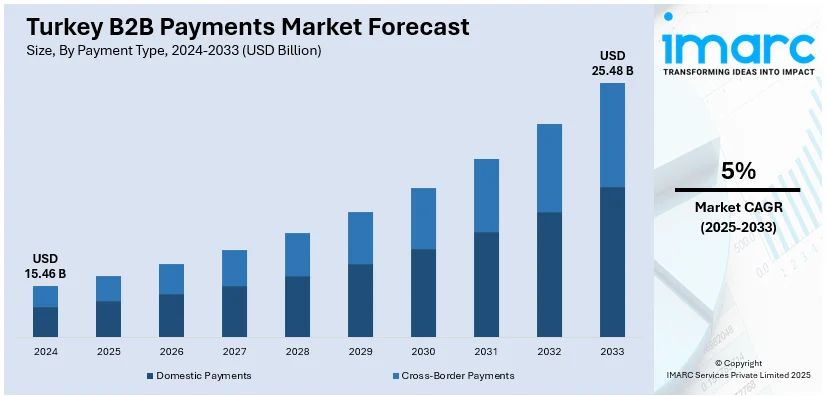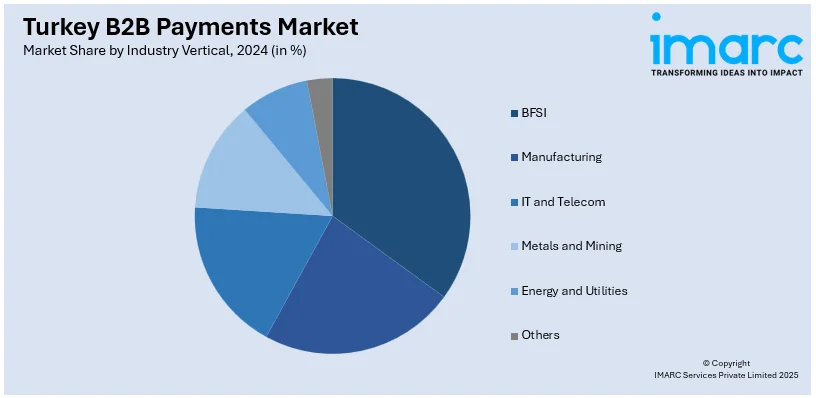
Turkey B2B Payments Market Size, Share, Trends and Forecast by Payment Type, Payment Mode, Enterprise Size, Industry Vertical, and Region, 2025-2033
Turkey B2B Payments Market Overview:
The Turkey B2B payments market size reached USD 15.46 Billion in 2024. The market is projected to reach USD 25.48 Billion by 2033, exhibiting a growth rate (CAGR) of 5% during 2025-2033. Increasing digitalization of financial services, government support for cashless transactions, growing SME adoption of electronic payment solutions, demand for cross-border trade facilitation, and rising efficiency needs in corporate treasury operations are some of the factors contributing to the Turkey B2B payments market share. Expanding fintech infrastructure and real-time payments further accelerate growth.
|
Report Attribute
|
Key Statistics
|
|---|---|
|
Base Year
|
2024
|
|
Forecast Years
|
2025-2033
|
|
Historical Years
|
2019-2024
|
| Market Size in 2024 | USD 15.46 Billion |
| Market Forecast in 2033 | USD 25.48 Billion |
| Market Growth Rate 2025-2033 | 5% |
Turkey B2B Payments Market Trends:
Digital Payment Platforms Reshaping Corporate Transactions
The B2B payments sector in Turkey is changing dramatically as firms move away from traditional banking channels and toward digital payment platforms. Companies are increasingly adopting fintech-driven solutions that provide faster processing, greater transparency, and better transaction tracking. Delays associated with traditional bank transfers are being minimized as real-time gross settlement (RTGS) systems and immediate transfer services gain traction. This shift is especially beneficial to small and medium-sized businesses (SMEs), which have previously suffered cash difficulties owing to delayed settlement timeframes. Furthermore, API-driven connections enable firms to incorporate payment solutions directly into their ERP and accounting systems, reducing manual intervention and reconciliation issues. Cross-border B2B payments are also benefiting from digital innovation, with Turkish exporters adopting fintech platforms that support multi-currency settlements at competitive exchange rates. This shift is not only reducing costs but also enabling firms to access new markets with greater efficiency. As more businesses embrace automation, digital platforms are poised to become the default choice for B2B payments in Turkey. These factors are intensifying the Turkey B2B payments market growth.

To get more information on this market, Request Sample
Growing Role of Supply Chain Financing
A parallel trend shaping Turkey’s B2B payments market is the expansion of supply chain financing as businesses seek to optimize working capital and reduce financial strain. Large corporates are increasingly collaborating with banks and fintech firms to offer early payment solutions to their suppliers. This approach enables SMEs to receive quicker access to funds while buyers can negotiate longer payment terms, striking a balance that supports both parties. With inflationary pressures and fluctuating currency exchange rates in Turkey, liquidity management has become a priority for businesses, driving demand for financing models tied directly to B2B transactions. Digital platforms are playing a central role by integrating financing options into payment workflows, making access to credit more seamless. As a result, B2B payments are evolving beyond simple money transfers into strategic financial tools that strengthen supply chains. The adoption of blockchain-based smart contracts and digital factoring solutions is also gaining traction, further enhancing trust, reducing fraud risk, and lowering the overall cost of financing in corporate trade.
Turkey B2B Payments Market Segmentation:
IMARC Group provides an analysis of the key trends in each segment of the market, along with forecasts at the country and regional level for 2025-2033. Our report has categorized the market based on payment type, payment mode, enterprise size, and industry vertical.
Payment Type Insights:
- Domestic Payments
- Cross-Border Payments
The report has provided a detailed breakup and analysis of the market based on the payment type. This includes domestic payments and cross-border payments.
Payment Mode Insights:
- Traditional
- Digital
The report has provided a detailed breakup and analysis of the market based on the payment mode. This includes traditional and digital.
Enterprise Size Insights:
- Large Enterprises
- Small and Medium-sized Enterprises
The report has provided a detailed breakup and analysis of the market based on the enterprise size. This includes large enterprises and small and medium-sized enterprises.
Industry Vertical Insights:

- BFSI
- Manufacturing
- IT and Telecom
- Metals and Mining
- Energy and Utilities
- Others
The report has provided a detailed breakup and analysis of the market based on the industry vertical. This includes BFSI, manufacturing, IT and telecom, metals and mining, energy and utilities, and others.
Regional Insights:
- Marmara
- Central Anatolia
- Mediterranean
- Aegean
- Southeastern Anatolia
- Black Sea
- Eastern Anatolia
The report has also provided a comprehensive analysis of all the major regional markets, which include Marmara, Central Anatolia, Mediterranean, Aegean, Southeastern Anatolia, Black Sea, and Eastern Anatolia.
Competitive Landscape:
The market research report has also provided a comprehensive analysis of the competitive landscape. Competitive analysis such as market structure, key player positioning, top winning strategies, competitive dashboard, and company evaluation quadrant has been covered in the report. Also, detailed profiles of all major companies have been provided.
Turkey B2B Payments Market News:
- July 2025: Mastercard partnered with Octet Türkiye to boost B2B payments in Turkey by introducing a card-based solution for businesses. The platform supports corporate transactions, easing payments and collections while enabling installment options. This move addresses the growing demand for digital alternatives to cash. With Statista projecting digital B2B payments in MEA to nearly double by 2028, the collaboration aims to accelerate adoption and enhance corporate cash flow management.
Turkey B2B Payments Market Report Coverage:
| Report Features | Details |
|---|---|
| Base Year of the Analysis | 2024 |
| Historical Period | 2019-2024 |
| Forecast Period | 2025-2033 |
| Units | Billion USD |
| Scope of the Report |
Exploration of Historical Trends and Market Outlook, Industry Catalysts and Challenges, Segment-Wise Historical and Future Market Assessment:
|
| Payment Types Covered | Domestic Payments, Cross-Border Payments |
| Payment Modes Covered | Traditional, Digital |
| Enterprise Sizes Covered | Large Enterprises, Small and Medium-sized Enterprises |
| Industry Verticals Covered | BFSI, Manufacturing, IT and Telecom, Metals and Mining, Energy and Utilities, Others |
| Regions Covered | Marmara, Central Anatolia, Mediterranean, Aegean, Southeastern Anatolia, Black Sea, Eastern Anatolia |
| Customization Scope | 10% Free Customization |
| Post-Sale Analyst Support | 10-12 Weeks |
| Delivery Format | PDF and Excel through Email (We can also provide the editable version of the report in PPT/Word format on special request) |
Key Questions Answered in This Report:
- How has the Turkey B2B payments market performed so far and how will it perform in the coming years?
- What is the breakup of the Turkey B2B payments market on the basis of payment type?
- What is the breakup of the Turkey B2B payments market on the basis of payment mode?
- What is the breakup of the Turkey B2B payments market on the basis of enterprise size?
- What is the breakup of the Turkey B2B payments market on the basis of industry vertical?
- What is the breakup of the Turkey B2B payments market on the basis of region?
- What are the various stages in the value chain of the Turkey B2B payments market?
- What are the key driving factors and challenges in the Turkey B2B payments market?
- What is the structure of the Turkey B2B payments market and who are the key players?
- What is the degree of competition in the Turkey B2B payments market?
Key Benefits for Stakeholders:
- IMARC’s industry report offers a comprehensive quantitative analysis of various market segments, historical and current market trends, market forecasts, and dynamics of the Turkey B2B payments market from 2019-2033.
- The research report provides the latest information on the market drivers, challenges, and opportunities in the Turkey B2B payments market.
- Porter's Five Forces analysis assists stakeholders in assessing the impact of new entrants, competitive rivalry, supplier power, buyer power, and the threat of substitution. It helps stakeholders to analyze the level of competition within the Turkey B2B payments industry and its attractiveness.
- Competitive landscape allows stakeholders to understand their competitive environment and provides an insight into the current positions of key players in the market.
Need more help?
- Speak to our experienced analysts for insights on the current market scenarios.
- Include additional segments and countries to customize the report as per your requirement.
- Gain an unparalleled competitive advantage in your domain by understanding how to utilize the report and positively impacting your operations and revenue.
- For further assistance, please connect with our analysts.
 Request Customization
Request Customization
 Speak to an Analyst
Speak to an Analyst
 Request Brochure
Request Brochure
 Inquire Before Buying
Inquire Before Buying




.webp)




.webp)












